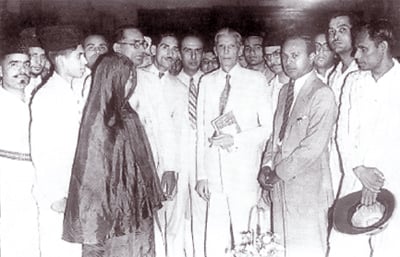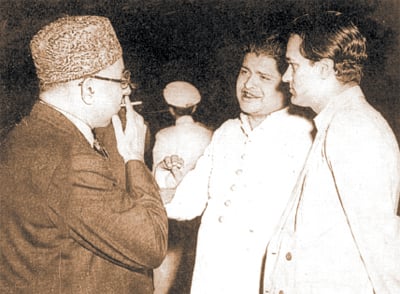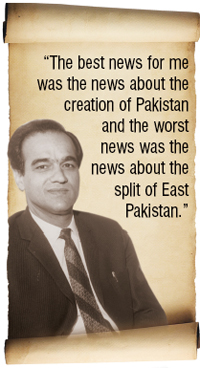MKR:
A TREASURE OF INFORMATION
By
Abdul Hameed Chhapra
The
20th death anniversary of renowned and most respected journalist
of the Indo-Pak Sub-continent and founder of the Jang Group of newspapers
and journals Mir-Khalil-ur-Rahman will be solemnly observed on Wednesday
25th January, 2012.
 Man
is a mortal being, However, those individuals who dedicate their
tireless efforts for the well being of their relatives, friends,
colleagues as well as the society at large, are remembered for generations
after generations, even after they depart to their heavenly abodes. Man
is a mortal being, However, those individuals who dedicate their
tireless efforts for the well being of their relatives, friends,
colleagues as well as the society at large, are remembered for generations
after generations, even after they depart to their heavenly abodes.
It
is an established fact that Mir Saheb during more than 50 years
of the 20th century contributed a treasure of information. Time
and again this has been recognised by eminent personalities like
veteran poet, banker and columnist Jamiludidn Aali, famous journalist
and information minister in Pakistan’s embassy (High Commission)
in London. Qutubuddin Aziz, well known journalist and former chief
of the Mass Communication Department of Karachi University Professor
Dr Nisar Ahmed Zuberi, veteran journalist Farhad Zaidi and famous
journalist and poet Shafi
Aqeel.
This
scribe had the good fortune of serving and learning from Mir Saheb’s
generosity for more than quarter of a century between mid-1960s
to 1990s as senior reporter of Jang and columnist of Akhbar-e-Jahan
and the Mag.
Mir
Khalil-ur-Rahman was a collector who loved and strived to gather
journalistic gems and jewels in his organisations. People like Syed
Mohammad Taqi, Yusuf Siddiqui, Raees Amrohvi, Ather Ali, Inam Aziz
and Shafi Aqeel are to name a few. Mir Saheb launched Daily Jang
from Delhi, the then capital of the British India, during the Second
World War (1939-1945).
Those
who were lucky to learn from Mir Saheb, admit that Mir Saheb used
to study a lot to keep himself abreast of the inventions and innovations
in the field of printing and related technologies. It was due to
this reason that Jang Group of newspapers and journalists were in
the forefront and first to introduce latest developments in all
fields of print industry.
It
was due to his devotion and well mannerism that Mir Saheb was liked
by almost every section of population since he used to keep himself
in constant contact with people at the helm of affairs and also
with ordinary citizens to learn about the problems faced by common
people.
Mir
Khalil-ur-Rahman embarked on his mission of informing people after
23rd March, 1940’s Pakistan Resolution. Under the influence
of the Pakistan Resolution presented on this date, the Muslims of
India started the movement for the creation of Pakistan under the
leadership of the Quaid-i-Azam Mohammad Ali Jinnah.
Pakistan’s
movement was ruthlessly and fearlessly opposed by the leaders of
Indian National Congress like Pandit Javahar Lal Nehru and Sardar
Walhab Bhai Patel. At that time Mir Saheb’s contribution for
the creation of Pakistan was commendable. He bravely faced all odds
and even he was arrested and put behind bar.
All
his life, Mir Saheb worked hard to achieve the level of perfection
that he desired and wanted for his newspapers and journals.
 Senior
staffers and regulars like this scribe are witness to the fact that
Mir Saheb used to work almost 16 hours daily. He would monitor almost
all newspapers and magazines. Senior
staffers and regulars like this scribe are witness to the fact that
Mir Saheb used to work almost 16 hours daily. He would monitor almost
all newspapers and magazines.
Mir
Saheb who started from scratch was recognised as the most successful
newspaper magnate about two decade before his demise. When the first
dictator Gen Ayub Khan shifted Pakistan’s capital from Karachi
to Rawalpindi Mir Saheb also launched Jang’s Rawalpindi issue
along with Jang, Karach.
Mir
Saheb launched English evening Daily News from Karachi which in
a short period of time became the largest circulated eveninger beating
the old eveningers like The Leader, Evening Star and The Comment
in circulation as well as the readership.
In
the early 1970s, Mir Saheb started publication of Roznama Jang from
the capital of Great Britain London. Hence Jang became the only
newspaper published simultaneously from Asia and Europe.
Editor
of Daily News for the past 23 years S M Fazal was among those journalists
who joined the newspaper in 1962.
Senior
journalist Yunus Riaz who joined Jang in 1964 and served it in various
capacities, praised Mir Saheb for his devotion and knowledge.
Pre-partition
Urdu journalism owed a lot to stalwarts like Maulana Abul Kalam
Azad, Maulana Mahboob Alam and Maulana Zafar Ali Khan. Since partition
of India on 14th/15th August, 1947, Jang’s contribution to
Urdu journalism is incomparable and was praised by Pakistanis both
locally and settled abroad for their monetary gains. Dr Nisar Ahmad
Zuberi who served Jang group for more than two decades ranks Mir
Saheb as undisputed “King of the Jang Empire”.
Almost
daily in the morning session Mir Saheb used to guide his staff members
that Jang does not belong to any political party; he wants that
every event in Pakistan, particularly in Karachi, should be covered
in the newspaper, since its policy is to give coverage to every
segment of the society. Mir Saheb used to say that Jang’s
policy is to redress the grievances of the masses. It is not in
favour or against any political party or group.
Jang
Group had to pay for its independent policies. On the instruction
of military rulers and civilian despots the bureaucracy, used to
pressurise Jang Group to toe the official line. From first dictator
Gen Ayub Khan to third dictator Gen Ziaul Haq’s reign, Jang
had to brave intimidation almost every day. But Mir Saheb never
compromised on principles and always stood for truth.
Veteran
journalist S M Fazal who enjoys the decades of experience said Mir
Saheb had the ability to attract those who had a natural desire
to serve the field of journalism. In this connection he specially
mentioned names like Shamim Ahmad (first Editor of Daily News),
Khawaja Ibtisam Ahmad, Suleman Ahmad Minai, M T (Mohammad Tayyab)
Bokhari, Zamir Niazi, Muhammad Ali Siddiqui and Wajid Shamsul Hasan
(who remained editor Daily News from 1968 to 1988).
Mir
Saheb had an excellent memory and he remembered the names of all
workers of Jang Group whose number had increased to four figures
with the passage of time. He used to redress the grievances of all
workers and financially obliged everybody in their hours of need.
God
bless Mir Saheb (Aameen)
—The
writer is a senior journalist
|

